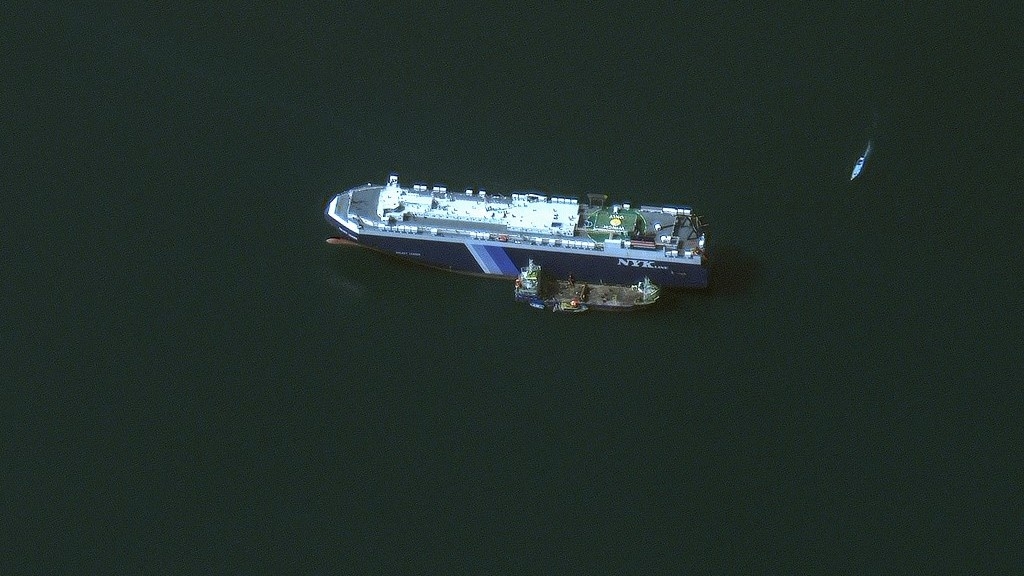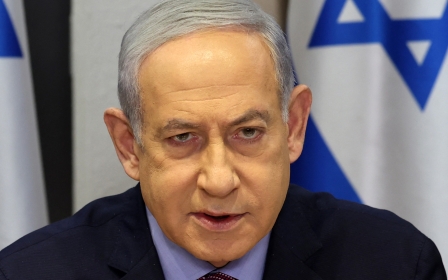War on Gaza: UK 'willing to take direct action' against Houthis amid Red Sea attacks

British Defence Secretary Grant Shapps has said his country's armed forces are ready to join the US and potentially go to war in Yemen.
In a newspaper article for the Daily Telegraph, Shapps said the UK was "willing to take direct action" against the Houthi movement after the US said its navy sank three boats over the weekend for allegedly targeting a container ship in the Red Sea.
“The situation in the Red Sea is incredibly serious, and although it is thousands of miles away, it has an impact on everyone in Britain,” said Shapps.
The Houthis have targeted ships passing through the Bab-el-Mandeb strait between Yemen on the Arabian Peninsula and Djibouti, and Eritrea in the Horn of Africa.
In press announcements, the Houthis have said they are only targeting ships going to Israel while all other ships may pass through safely.
New MEE newsletter: Jerusalem Dispatch
Sign up to get the latest insights and analysis on Israel-Palestine, alongside Turkey Unpacked and other MEE newsletters
They have also said that their naval blockade against Israel will stop once Israel’s war on Gaza and the blockade on humanitarian supplies for Palestinians is lifted.
Since Israel's war on Gaza started on 7 October, the group has launched more than 100 drone and missile attacks in the straits for ships bound for Israel.
“The Houthis should be under no misunderstanding: we are committed to holding malign actors accountable for unlawful seizures and attacks,” said Shapps.
He added: "Continued Red Sea aggression risks miscalculation and escalation which could trigger a region-wide conflict."
Follow Middle East Eye's live coverage of the Israel-Palestine war
If the Red Sea was not protected, wrote the British defence secretary, "it risks emboldening those looking to threaten elsewhere including in the South China Sea and Crimea."
David Cameron, the British foreign secretary, said he had spoken to Iran’s foreign minister, Hossein Amir-Abdollahian, on Sunday.
“I spoke to [Amir-Abdollahian] today about Houthi attacks in the Red Sea, which threaten innocent lives and the global economy,” Cameron said on X, formerly known as Twitter. “I made clear that Iran shares responsibility for preventing these attacks given their longstanding support to the Houthis.”
Coalition against the Houthis
The US launched a largely western-backed operation in December to ensure ships heading to Israel would not be attacked.
Britain, Canada and France joined the operation, while the only regional country to sign up was Bahrain. Saudi Arabia, which shares a border with Yemen and the United Arab Emirates, did not join the US-backed initiative.
Countries, including Spain and Italy, backed out of the US operation.
On Sunday, the US Navy said it destroyed several Houthi-operated "small boats" whose crew tried to board a container ship in the Red Sea killing at least 10 on three vessels, while a fourth boat retreated to Yemen.
If the US and the UK were to directly target Houthi missile launch sites within the country, this would be a serious escalation of Israel’s War on Gaza.
The attacks on the Houthi boats were the first confirmed US attack on armed groups participating in hostilities against Israel.
US support has so far included a generous $14bn aid package and regular supplies of arms.
By participating in combat against Yemen's Houthis, the US risks strengthening perceptions in the Islamic world that it is a co-belligerent, alongside Israel, in its war on Gaza and not merely a supporter.
The Red Sea is one of the world's most important shipping lanes, linking European and Asian markets through the Suez Canal.
Around 12 percent of global trade passes through the Bab-el-Mandeb strait, near to where the Houthis are targeting shipping.
Middle East Eye delivers independent and unrivalled coverage and analysis of the Middle East, North Africa and beyond. To learn more about republishing this content and the associated fees, please fill out this form. More about MEE can be found here.




